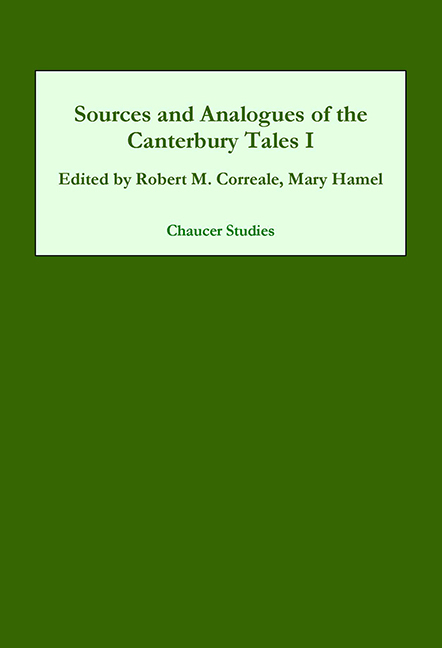Book contents
- Frontmatter
- Contents
- preface
- Acknowledgements
- The Frame
- The Reeve's Tale
- The Cook's Tale
- The Friar's Tale
- The Clerk's Tale
- The Squire's Tale
- The Franklin's Tale
- The Pardoner's Prologue and Tale
- The Tale of Melibee
- The Monk's Tale
- The Nun's Priest's Tale
- The Second Nun's Prologue and Tale
- The Parson's Tale
- Contributors and editors
- General Index
- Index of Manuscripts
The Reeve's Tale
Published online by Cambridge University Press: 25 October 2017
- Frontmatter
- Contents
- preface
- Acknowledgements
- The Frame
- The Reeve's Tale
- The Cook's Tale
- The Friar's Tale
- The Clerk's Tale
- The Squire's Tale
- The Franklin's Tale
- The Pardoner's Prologue and Tale
- The Tale of Melibee
- The Monk's Tale
- The Nun's Priest's Tale
- The Second Nun's Prologue and Tale
- The Parson's Tale
- Contributors and editors
- General Index
- Index of Manuscripts
Summary
One of the most popular fabliaux in medieval Europe was the story of two young men who trick their host, one by seducing his daughter and the other by making love to his wife after the shifting of a cradle containing his baby. Chaucer clearly did not invent the broad outlines of what is sometimes called the “cradle-trick story” that he adapted for his own literary purposes in the Reeve's Tale. Though none of the analogues – at least not in the forms that survive – can be said to represent “the source” of Chaucer's tale, the story itself was apparently so widely known that it is almost certain that Chaucer had read at least one, and quite possibly more than one, of the versions presented here. In addition to the cradle-trick story in the Reeve's Tale, there are three surviving versions of it in French, one in Flemish, one in Italian, and two in German, all of them almost surely predating Chaucer. There are also several later analogues. A central scholarly problem in dealing with so many analogues is determining which among them are closest to the Reeve's Tale.
Frederick Furnival attempted to solve the problem by publishing two French analogues, Text A of Le meunier et les. II. clers and Jean Bodel's De Gombert et des deus clers. In an influential study, Germaine Dempster later stated that only the two French texts of Le meunier et les. II. clers (A and B) should b seriously considered by Chaucerians interested in working with “the source” of the Reeve's Tale, and she concluded that some near relative of Text B was most likely Chaucer's source. Dempster's arguments persuaded W. M. Hart to disregard all other known analogues and present only texts A and B of Le meunier in his chapter on the Reeve's Tale in Bryan and Dempster. More recently, however, scholars have taken a broader view of the relationship of Chaucer's tale to the other versions of the story. Rather than focus their attention on discovering “the source” of the tale, they study its relationship to several possible sources.
- Type
- Chapter
- Information
- Sources and Analogues of the Canterbury Tales: vol. I , pp. 23 - 74Publisher: Boydell & BrewerPrint publication year: 2002

